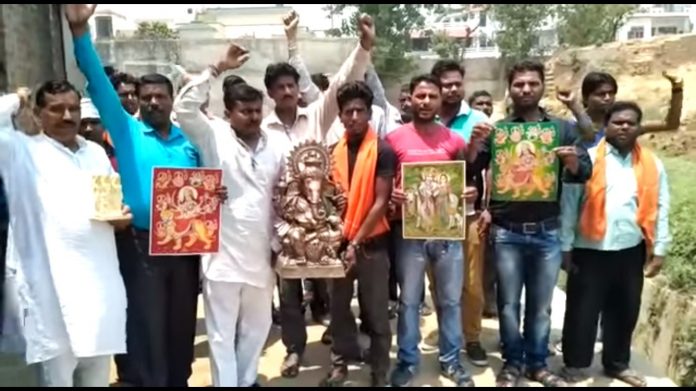By Mohit Dubey
Lucknow, (IANS): Politicians have never shied away from using crime, riots or caste and communal clashes for furthering their interests. The latest round of caste clashes in Saharanpur district of western Uttar Pradesh seems to have yet again provided political parties the grist to drum up support among their respective constituencies and take cynical advantage of a tragedy that has left two dead and scores injured.
And so as villages like Chandrapura, neighbouring Shabbirpur — Ground Zero in the current spell of violence — and some more in the vicinity are witness to sword fights, stone-pelting and firing between rival groups, local politicians have added fuel to the fire.
The first to jump into the ring was the Samajwadi Party (SP), which after its rout in the state assembly elections, saw its chance to fish in troubled waters as clashes erupted between Dalits and Rajputs.
Though both the stakeholders — the Dalits and the Thakurs — in the bitter feud are not traditionally the support base of the SP, it did not stop the latter from accusing the ruling Bharatiya Janata Party (BJP) of failing miserably on the law and order front.
Former Chief Minister Akhilesh Yadav targeted the state government in the Vidhan Parishad, accusing it of “abject failure” in maintaining communal harmony, peace, and law and order in the state. “They accused us of doing nothing, now look what they are doing… it’s both sad and disappointing,” the 44-year-old opposition leader fumed.
Decimated in two back-to-back polls — the 2014 Lok Sabha elections and the 2017 assembly elections — the Bahujan Samaj Party (BSP) is now using the clashes at Saharanpur to regain lost ground, specially among its core vote bank, the Dalits.
And it is for this reason that BSP supremo Mayawati, who has not taken a road trip anywhere since 2003, finally hit the road in the sweltering May heat to drive from her New Delhi house to Saharanpur to show sympathy for the Dalit victims and support for their cause.
Used to heli-hopping on such occasions, the Dalit leader made no bones about her political gameplan either. She stopped at various places en route, invited the media (also a departure from her traditional style of keeping the press at bay) and mingled with the victims and their families.
No sooner had she started from Delhi on Tuesday than violence erupted in Shabbirpur village, already singed by conflicts since April 20. District officials say the Dalits suddenly felt emboldened and attacked the houses of upper caste Rajputs, set them on fire and went on a rampage.
The four-time Uttar Pradesh Chief Minister urged the “Dalit Samaj” not to be scared and be with the BSP to safeguard their interests. Clearly rattled by the quiet but steady growth of a regional outfit, Bheem Sena, Mayawati appealed to such splinter groups to come under the “big, solid umbrella of the BSP”.
Saharanpur has been a bastion of the BSP support and even in the 2012 elections, when the party was ousted from power, the BSP managed to have three legislators elected from this district. Mayawati has contested from Saharanpur twice and the BSP under Kanshiram, its founder, started its political journey from here as well.
Soon after she left the village, violence re-ignited and escalated, leading to the killing of two persons, damage to property and attacks on Rajputs. Lalji Prasad Nirmal, the president of Dr Ambedkar Sabha, a Dalit outfit, blames the new government of Chief Minister Yogi Adityanath for the violence and says the decision to allow Mayawati in the strife-torn village was a grave mistake.
With fires being stoked by politicians, the state government went into damage-control mode and sent four senior officials to the violence-hit regions. Their political bosses, however, took little time to resort to the blame game.
State Power Minister and government spokesman Srikant Sharma alleged that the BSP had incited violence in Saharanpur and that the visit of Mayawati, rather than pacifying the Dalits, had triggered the fresh round of violence.
Chief Minister Aditynath, who had so far used his spokesmen and other crisis managers to “sort out the first major challenge” to his two-month-old government, finally spoke on Wednesday night.
In a statement released by his office, Adityanath, himself a Thakur, appealed to people of the state not to pay heed to rumours and inflammatory speeches and statements but to help the state government to bring the matter under control.
Clarifying that his government did not represent any caste, community or religion and that it was guided by the principle of “Sabka Saath, Sabka Vikas” (government for all, development for all), Yogi also accused “some forces of not being able to digest the welfare schemes rolled out by my government”.
The BSP has not taken kindly to this insinuation by the Chief Minister and is planning to hit back.
Whatever be the case, people seem to be both sceptical and scared of whatever is unfolding in the state as politicians get ready to play with caste and communal fire at the cost of the state’s harmony and development.

